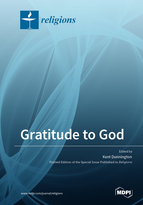Gratitude to God
A special issue of Religions (ISSN 2077-1444). This special issue belongs to the section "Religions and Theologies".
Deadline for manuscript submissions: closed (15 August 2022) | Viewed by 27557
Special Issue Editor
Special Issue Information
Dear Colleagues,
You are invited to submit a paper to a Special Issue of the journal Religions. The Special Issue is entitled “Gratitude to God”, and its purpose is to gather emerging research—philosophical, theological, and psychological—on gratitude to God. Although there is a large psychological and philosophical literature on gratitude generally, the aim of this Special Issue is to focus specifically on gratitude to God. Apart from several classical theological treatments of gratitude to God (in Aquinas, Calvin, and Barth, for example) this is a new field of research. The Special Issue invites conceptual analysis, historical or genealogical analysis, and empirical analysis of gratitude to God (as well as its attendant concepts of divine beneficence and divine gift).
Dr. Kent Dunnington
Guest Editor
Manuscript Submission Information
Manuscripts should be submitted online at www.mdpi.com by registering and logging in to this website. Once you are registered, click here to go to the submission form. Manuscripts can be submitted until the deadline. All submissions that pass pre-check are peer-reviewed. Accepted papers will be published continuously in the journal (as soon as accepted) and will be listed together on the special issue website. Research articles, review articles as well as short communications are invited. For planned papers, a title and short abstract (about 100 words) can be sent to the Editorial Office for announcement on this website.
Submitted manuscripts should not have been published previously, nor be under consideration for publication elsewhere (except conference proceedings papers). All manuscripts are thoroughly refereed through a double-blind peer-review process. A guide for authors and other relevant information for submission of manuscripts is available on the Instructions for Authors page. Religions is an international peer-reviewed open access monthly journal published by MDPI.
Please visit the Instructions for Authors page before submitting a manuscript. The Article Processing Charge (APC) for publication in this open access journal is 1800 CHF (Swiss Francs). Submitted papers should be well formatted and use good English. Authors may use MDPI's English editing service prior to publication or during author revisions.
Keywords
- gratitude
- gratitude to God
- gift
- reciprocity
- debt of gratitude






